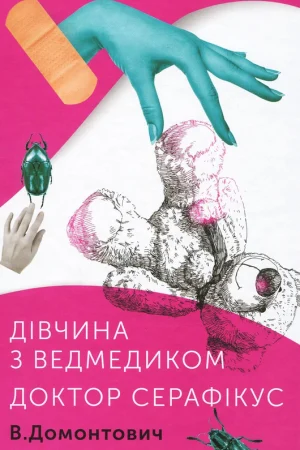 A girl with a teddy bear. Dr. Seraphicus
A girl with a teddy bear. Dr. SeraphicusBuy Ukrainian Books / Fiction / Classic Fiction / A girl with a teddy bear. Dr. Seraphicus
Buy Book "A girl with a teddy bear. Dr. Seraphicus" in Ukrainian
$27.95
Free Shipping Worldwide
for orders over $4999

Дівчина з ведмедиком. Доктор Серафікус
Віктор Домонтович
Viktor Domontovych
A girl with a teddy bear. Dr. Seraphicus
Discover “The Maid” by Nita Prose
If you are looking to buy “The Maid” in Ukrainian, you have come to the right place. This captivating novel by Nita Prose has gained popularity in the US and Canada, appealing to readers who appreciate unique storytelling. Here are some compelling reasons to get your copy:
- Engaging Storyline: “The Maid” takes you on a journey filled with twists and turns, making it a page-turner.
- Unique Protagonist: The main character offers a fresh perspective, allowing readers to connect deeply with her experiences.
- Emotional Depth: The narrative explores themes of love, loss, and resilience that resonate with many readers.
- Critical Acclaim: This book has received numerous positive reviews from both critics and readers alike.
- Available in Ukrainian: Now you can enjoy “The Maid” in the language you prefer.
Don’t miss out on this special literary work! You can easily buy “The Maid” by Nita Prose online and immerse yourself in a beautiful story.
Why Choose Us?
When you decide to purchase from us, you are choosing a retailer who values customer satisfaction. Here are some of our strong points:
- Best Prices: We offer competitive prices on all our books.
- Good Discounts: Stay tuned for seasonal promotions and discounts on your favorite titles.
- Fast Shipping: Orders are dispatched promptly from Kyiv and Lviv.
- Rare Book Assistance: We help you locate and purchase hard-to-find books from Ukraine.
- Support Ukrainian Army: Each purchase contributes to donations for the Ukrainian army.
We accept various payment methods, including PayPal, Visa, Mastercard, and other banking cards. Our shipping options include Ukrpost, USPS, UPS, and DHL, ensuring your books reach you no matter where you are in the world.
Experience the magic of “The Maid” by Nita Prose today—your next great read awaits!
Additional info
| Year | |
|---|---|
| Cover | |
| Pages count | 288 |
| Page size | 150 |
| Original title | Дівчина з ведмедиком. Доктор Серафікус |
| Author |
Related Categories
7 reviews for A girl with a teddy bear. Dr. Seraphicus
4.29
/5Based on 07 rating(s)
Customer's reviews
Sort by
-
Natalka Kalish
“The Girl with the Bear” and “Dr. Seraphicus” are novels by Viktor Petrov-Domontovych written in 1928-29.
The cover design and the author’s unfamiliar (I confess) surname caught my interest. I’ll leave the author’s mysterious personality to the researchers of his biography and works. I’ll share my impressions of two novels under one cover.
It is a long read. There are 280 pages in total, including a long foreword by Vira Ageeva, the content of which is available only to literary critics and historians, and I, a mere mortal reader, might want to read it again, after the novels. But I don’t want to.
The novels were written almost 100 years ago, and the language of the text is so delicious, I can’t think of a more apt epithet. It contains all the linguistic “tricks” that have recently been returned to Ukrainian grammar, as the compilers tried to preserve the author’s style wherever possible. Open the book anywhere and you will come across: coffeehouse, mith, material, befriended, chemical laboratory, clichéd stanzas, examined a stranger he met, needed only for the aesthetic completeness of his aristocratic hobbies. The text editor underlines these words because it does not find them in its built-in dictionary.
To the plot.
“The Girl with the Bear is about a teacher falling in love with his very young student. And this is against the backdrop of the post-revolutionary life of the Ukrainian capital, the total poverty of the young chemist, the destruction of patriarchal family traditions, and feminism (although the text does not use this word, there are signs of it). After all, the girl Zina wants to make decisions about herself and her future on her own. She wants to choose when and with whom she wants to have sex. And she doesn’t want to get married when a decent teacher offers her marriage. Where does this lead her? To Berlin. What does she do there? Uh-huh.
“Dr. Seraphicus.” At first, I didn’t understand the meaning of this word “seraphic.” It’s derived from “Seraphim.” Seraphic means angelic. Seraphim has no gender, has up to sixteen faces, and is a disembodied fiery creature… So is the main character, whose name I won’t give you right away, but whose surname is Komakha. He is a scientist, a researcher of marks, immersed in science, as deeply immersed as one can imagine. He doesn’t notice anyone or anything around him, until he bumps into houses while walking down the street. The insect harbors the usual human desire to communicate with other people, to fall in love. This is similar to the modern concept of asexuality, perhaps. The protagonist considers sex to be lowly, shameful, unworthy of highly educated and cultured people. That’s what he thinks. And a woman named Ver, who is uninhibited in every sense, is interested in him, even though she is engaged in translations, not in what Zina ends up doing in the previous novel. She takes an interest while Komakha was indifferent. She takes him to the theater, “tomorrow night you can come to see me.” But this story ends with the banal suffering of the poor Insect: “I do not exist. You exist. I exist as you. I have two desires: one is to disappear in you, and the other is to give you all of me.” “You are unattainable, Ver. I see you in my dreams almost every day, but I never meet you. You have been and you have gone, and I, in my anxious desire and hope to meet you, go, b
July 2, 2021Verified PurchaseHelpful?
Reply -
Eve
Viktor Domontovych is a Ukrainian writer who, together with Valerian Pidmohylnyi, is believed to have founded the genre of the Ukrainian intellectual novel. This particular edition contains two well-known stories from the writer’s oeuvre, namely The Girl with the Bear and Dr. Seraphicus. I really wanted to review the first story, because it is quite interesting and difficult. This novel has been called the first feminist novel in Ukraine and compared to Nabokov’s Lolita, but one thing is certain: it is a vivid example of a modernist neoclassical novel.
The protagonist of the story is a not-so-young man named Ippolit Nikolayevich, who is offered a job at the Tikhmenev family to give private lectures to two sisters, Zina and Lesya. And while Lesya is a conscientious student, a quiet and modest girl, Zina is a real devil, who attracts the attention of her teacher…
Of course, this is a very controversial story, because it is written about such a difficult topic.
June 13, 2021Verified PurchaseHelpful?
Reply -
Yulia Tsyba
The first task is to try to write a response to Petrov’s work itself, not a reflection on it))
Because the figure of Petrov attracts many people with its mystery.
The second task is to decide whether I liked the novel or not. And I can’t do that in any way.
The writing is beautiful and skillful. But the plot didn’t catch me.
I understand that for the 20s, this is a rather revolutionary book. Not in terms of military revolutions, but in terms of views on marriage, relationships, and sex.
Personally, I was not very interested in following the development of the relationship between the gray-haired chemist-teacher-intellectual Ippolit Mykolaiovych and his emotional, playful 17-year-old student Zina.
His brain was boiling with philosophical reflections. Zina’s was filled with emotions and rebellion against everything.
But amidst all these philosophical and loving emotions, one can enjoy the descriptions of cultural and gastronomic life in Kyiv. And I want more of that.
In general, Victor Petrov (Domontovych) did interest me, and I will continue to read his works, for sure. Especially since I haven’t read Dr. Seraphicus yet.
February 11, 2021Verified PurchaseHelpful?
Reply -
Roman Gonta
Viktor Petrov is one of the lesser-known Ukrainian intellectuals, writers, critics, and cultural critics of the twentieth century. Despite the fact that he is called the founder of the intellectual novel in Ukrainian culture, along with Valerian Pidmohylnyi, few people know about him and his works. One of these works is The Girl with the Bear.
The plot of the work is simple. After graduating from the university, Ipolit Nikolayevich, the protagonist, starts working at a factory, where he meets Tekhmenev, a representative of the Supreme Council of People’s Commissars, who asks Ipolit to become a tutor for his daughters, Zina and Lesya. After agreeing, the protagonist prepares for private lectures and later meets the girls. Later, the relationship between the girls and the lecturer develops and changes.
While reading the novel, feelings are changeable and contradictory: the reader is given a choice: read on to find out how the chapter ends, or reflect on the characters and their quotes, because there are a lot of them and many of them do make you think. In addition, the author has managed to convey the atmosphere of Kyiv and Crimea in 1926; it is impossible to tear oneself away from these episodes, word by word the reader is absorbed in the book and seems to be transported to those streets, beaches, and parks.
The main action takes place around three characters: Hippolyta, Zina, and Lesia, but the main conflict is between the lecturer and his younger sister, Zina. They are opposed, i.e. Hippolyte is a supporter of traditions and a calm, measured life, while Zina is his complete opposite, she goes against traditions, established social norms and rules.
Zina is a modernist according to Nietzsche; she asks what morality, rules, and the meaning of life are. She knows how to think, and she does it rationally, despite the fact that she is an irrationalist. Having deeply analyzed social norms and traditions, she tries to find something new, because she does not like the old. An example of her analysis is her constant arguments with the lecturer. That is, she is on her way to becoming a Übermensch (Superman). Constantly taking risks, doing things that no one else has done, she is looking for her own way. She asks herself whether she likes the relationship between a man and a woman, the role of women in society, and what “female happiness” means. Her sexual relationship with Hippolyta is an example of how she takes risks. Knowing full well that this is completely unacceptable and unprecedented for a girl in this society, she takes the risk because she wants to know, her thirst for knowledge makes her act.
Zina’s lover, Hippolyte, is her complete opposite; he lives according to tradition, rationally and measuredly. The book tells about his past, his student years, which were spent studying, learning the rules, the “absolute truths” of physics and chemistry. He was not allowed to ask questions, but instead was given the “truth”. As a result, his creativity was destroyed, crushed. Still, Hippolyte wanted to become a scientist. When he was graduating from university, he asked a professor what he should do to become a scientist. The professor replied that he shouldn’t even try, because Hippolyta had no new ideas; he could only study and retell someone else’s ideas, but he couldn’t create something of his own.
December 26, 2020Verified PurchaseHelpful?
Reply -
Anastasia Voloshina
An author I’ve heard a lot about lately. A classic of Ukrainian literature, not at all like the one we studied at school. This could not help but interest me, and I decided to get acquainted with the novels of the author. Indeed, it is quite different from what we are used to, it destroys all stereotypes and breaks the framework of “ukrlit”. There is no struggle for the will, patriotism and the plight of Ukrainians. Here at the top of the corner is a man, his inner world and experiences (and love, of course). The turbulent Twenties, the junction of eras, the humanization of industrialization, and technological progress. Someone sees in the changes new opportunities, feels free and “a man of the new age. Someone cannot accept the change in the familiar way of life, does not see their place in the new world, feels lost and hopeless. A lot of reflection and speculation about humanity and human qualities – something that is so clearly visible among the trends of world literature of the early twentieth century. What’s the catch? Purely subjective: this subject, like this period in literature, is one of my least favorite. I’ve never liked that sort of thing, simply because I fall asleep from all those intellectual philosophical texts, flip through a paragraph, and don’t quit just because I don’t know how to quit books unread. So, I think fans of this sort of thing should enjoy it. What I liked was the writing language, very colorful and “delicious”
September 15, 2020Verified PurchaseHelpful?
Reply
Related Books in Ukrainian
Related products
-
Ukrainian series (set of 3 books)
by Taras Shevchenko Children's fairy tales and myths $77.95 Add to cart -
I (dis)agree. How one woman who didn’t believe in marriage ended up getting married
by Elizabeth Gilbert Fiction $27.95 Add to cart

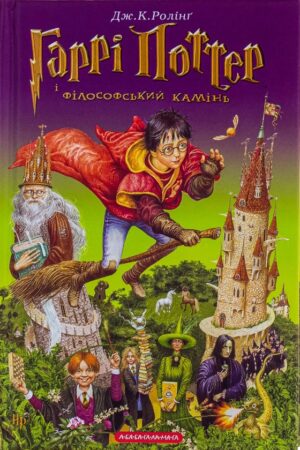
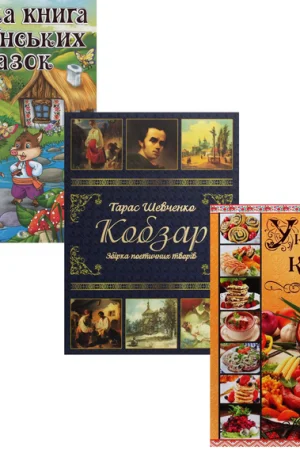
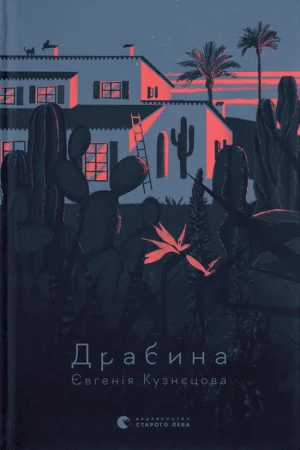
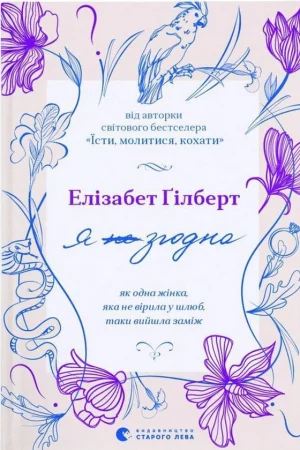
Leave feedback about this